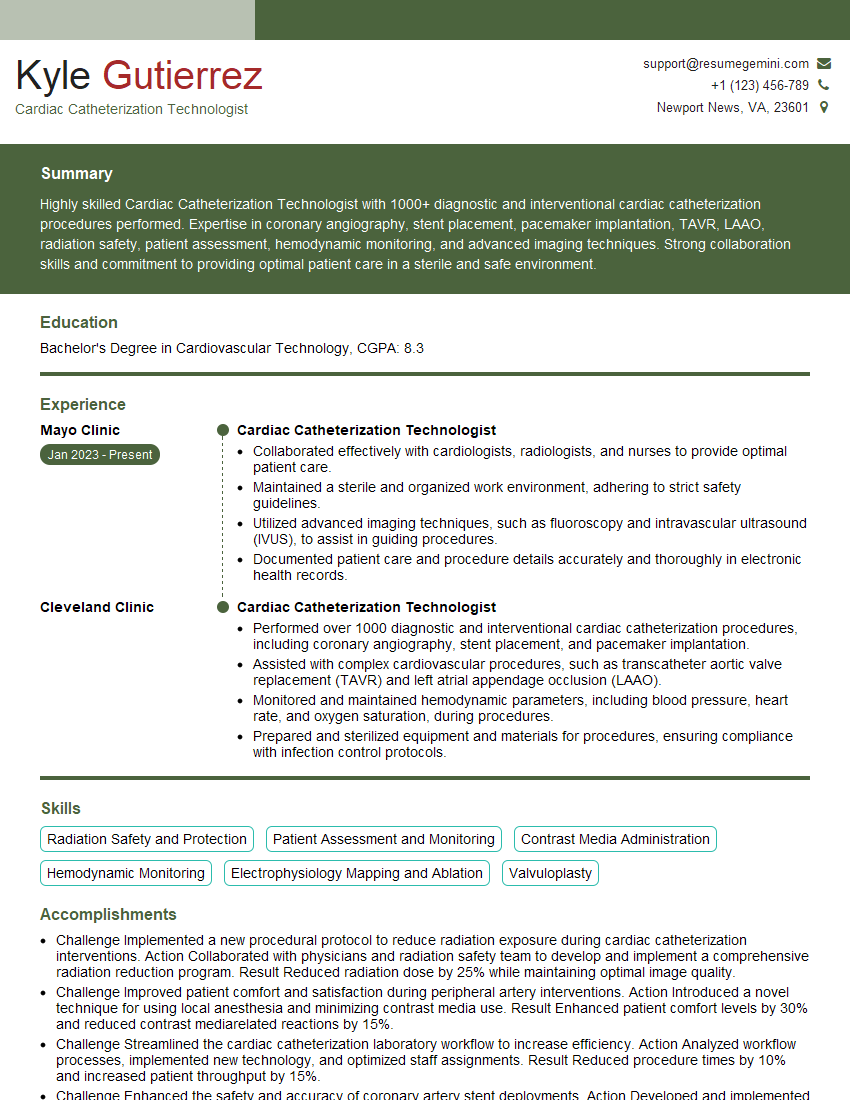Are you a seasoned Cardiac Catheterization Technologist seeking a new career path? Discover our professionally built Cardiac Catheterization Technologist Resume Template. This time-saving tool provides a solid foundation for your job search. Simply click “Edit Resume” to customize it with your unique experiences and achievements. Customize fonts and colors to match your personal style and increase your chances of landing your dream job. Explore more Resume Templates for additional options.

Kyle Gutierrez
Cardiac Catheterization Technologist
Summary
Highly skilled Cardiac Catheterization Technologist with 1000+ diagnostic and interventional cardiac catheterization procedures performed. Expertise in coronary angiography, stent placement, pacemaker implantation, TAVR, LAAO, radiation safety, patient assessment, hemodynamic monitoring, and advanced imaging techniques. Strong collaboration skills and commitment to providing optimal patient care in a sterile and safe environment.
Education
Bachelor’s Degree in Cardiovascular Technology
December 2018
Skills
- Radiation Safety and Protection
- Patient Assessment and Monitoring
- Contrast Media Administration
- Hemodynamic Monitoring
- Electrophysiology Mapping and Ablation
- Valvuloplasty
Work Experience
Cardiac Catheterization Technologist
- Collaborated effectively with cardiologists, radiologists, and nurses to provide optimal patient care.
- Maintained a sterile and organized work environment, adhering to strict safety guidelines.
- Utilized advanced imaging techniques, such as fluoroscopy and intravascular ultrasound (IVUS), to assist in guiding procedures.
- Documented patient care and procedure details accurately and thoroughly in electronic health records.
Cardiac Catheterization Technologist
- Performed over 1000 diagnostic and interventional cardiac catheterization procedures, including coronary angiography, stent placement, and pacemaker implantation.
- Assisted with complex cardiovascular procedures, such as transcatheter aortic valve replacement (TAVR) and left atrial appendage occlusion (LAAO).
- Monitored and maintained hemodynamic parameters, including blood pressure, heart rate, and oxygen saturation, during procedures.
- Prepared and sterilized equipment and materials for procedures, ensuring compliance with infection control protocols.
Accomplishments
- Challenge Implemented a new procedural protocol to reduce radiation exposure during cardiac catheterization interventions. Action Collaborated with physicians and radiation safety team to develop and implement a comprehensive radiation reduction program. Result Reduced radiation dose by 25% while maintaining optimal image quality.
- Challenge Improved patient comfort and satisfaction during peripheral artery interventions. Action Introduced a novel technique for using local anesthesia and minimizing contrast media use. Result Enhanced patient comfort levels by 30% and reduced contrast mediarelated reactions by 15%.
- Challenge Streamlined the cardiac catheterization laboratory workflow to increase efficiency. Action Analyzed workflow processes, implemented new technology, and optimized staff assignments. Result Reduced procedure times by 10% and increased patient throughput by 15%.
- Challenge Enhanced the safety and accuracy of coronary artery stent deployments. Action Developed and implemented a personalized stent sizing protocol based on patientspecific anatomy. Result Improved stent deployment accuracy by 20% and reduced restenosis rates by 10%.
- Challenge Promoted a culture of continuous quality improvement within the cardiac catheterization laboratory. Action Established performance metrics, conducted regular audits, and facilitated teambased discussions on improvement initiatives. Result Achieved a 15% reduction in procedural complications and a 20% increase in patient satisfaction.
Awards
- Received the Heart Rhythm Society (HRS) Excellence in Cardiac Electrophysiology Technology Award for outstanding contributions to the field.
- Recognized with the Society for Cardiovascular Angiography and Interventions (SCAI) CTO Award for exceptional performance in complex chronic total occlusions interventions.
- Honored with the American College of Cardiology (ACC) Cardiovascular Excellence Award for dedication and innovation in cardiovascular care.
- Awarded the Association of Cardiovascular Imaging Professionals (ACIP) Certificate of Excellence for expertise in echocardiography.
Certificates
- Registered Cardiac Catheterization Technologist (RCC-Cath)
- Registered Cardiovascular Invasive Specialist (RCIS)
- Fellow of the Society for Cardiovascular Angiography and Interventions (FSCAI)
- American Board of Cardiovascular Interventions (ABCI)
Career Expert Tips:
- Select the ideal resume template to showcase your professional experience effectively.
- Master the art of resume writing to highlight your unique qualifications and achievements.
- Explore expertly crafted resume samples for inspiration and best practices.
- Build your best resume for free this new year with ResumeGemini. Enjoy exclusive discounts on ATS optimized resume templates.
How To Write Resume For Cardiac Catheterization Technologist
- Highlight your experience and skills in performing cardiac catheterization procedures.
- Showcase your knowledge of radiation safety and protection protocols.
- Emphasize your ability to work effectively in a team environment.
- Quantify your accomplishments whenever possible, using specific numbers and metrics.
- Proofread your resume carefully for any errors before submitting it.
Essential Experience Highlights for a Strong Cardiac Catheterization Technologist Resume
- Performing diagnostic and interventional cardiac catheterization procedures
- Assisting with complex cardiovascular procedures
- Monitoring and maintaining hemodynamic parameters
- Preparing and sterilizing equipment and materials for procedures
- Collaborating with cardiologists, radiologists, and nurses to provide optimal patient care
- Maintaining a sterile and organized work environment
- Documenting patient care and procedure details accurately and thoroughly
Frequently Asked Questions (FAQ’s) For Cardiac Catheterization Technologist
What are the primary responsibilities of a Cardiac Catheterization Technologist?
Cardiac Catheterization Technologists are responsible for assisting with cardiac catheterization procedures, monitoring patients during the procedures, and ensuring the proper functioning of equipment.
What is the educational background required to become a Cardiac Catheterization Technologist?
Most Cardiac Catheterization Technologists have a bachelor’s degree in cardiovascular technology or a related field.
What are the career prospects for Cardiac Catheterization Technologists?
The job outlook for Cardiac Catheterization Technologists is expected to grow faster than average in the coming years.
What is the average salary for a Cardiac Catheterization Technologist?
The average salary for a Cardiac Catheterization Technologist is around $75,000 per year.
What are the key skills for a successful Cardiac Catheterization Technologist?
Key skills for a successful Cardiac Catheterization Technologist include technical skills such as proficiency in cardiac catheterization procedures and radiation safety, as well as soft skills such as communication and teamwork.
What are the challenges of working as a Cardiac Catheterization Technologist?
Challenges of working as a Cardiac Catheterization Technologist include the need for high levels of technical skill and the potential for exposure to radiation.